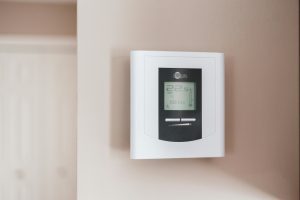Boiler efficiency is a measure of how effectively a boiler converts fuel into heat. It is an important factor to consider when evaluating the performance and cost-effectiveness of a boiler system. A high-efficiency boiler can save energy, reduce greenhouse gas emissions, and lower operating costs. There are several factors that affect boiler efficiency, including the design and construction of the boiler, the type and quality of fuel used, and the operating conditions.
Key Takeaways
- Regular maintenance and cleaning can significantly improve boiler efficiency.
- Upgrading insulation and sealing leaks can prevent heat loss and improve efficiency.
- Installing a programmable thermostat can help regulate temperature and reduce energy waste.
- Using high-efficiency burners and controls can improve combustion and reduce fuel consumption.
- Implementing a boiler control system can optimize performance and reduce energy waste.
Regular Maintenance and Cleaning
Regular maintenance and cleaning are essential for maintaining optimal boiler efficiency. Over time, boilers can accumulate dirt, debris, and scale, which can reduce their efficiency. Regular cleaning helps to remove these deposits and ensure that the boiler is operating at its peak performance. In addition to cleaning, regular maintenance tasks such as inspecting and replacing worn-out parts, lubricating moving components, and checking for leaks can also improve boiler efficiency.
To maintain and clean your boiler effectively, it is important to follow a few tips. First, make sure to schedule regular maintenance visits with a qualified technician who can inspect and clean your boiler system. Second, clean the boiler’s heat exchanger regularly to remove any buildup of scale or debris. Third, check the burner flame regularly to ensure that it is burning efficiently. Finally, keep the area around the boiler clean and free from dust or debris that could obstruct airflow.
Upgrading Insulation and Sealing Leaks
Upgrading insulation and sealing leaks in your boiler system can significantly improve its efficiency. Insulation helps to reduce heat loss from the boiler, ensuring that more of the heat generated by the burner is transferred to the water or steam. Sealing leaks in the system prevents air from entering or escaping, which can cause energy loss.
To upgrade insulation in your boiler system, consider adding insulation to pipes, valves, and fittings. This will help to reduce heat loss during transport. Additionally, insulating the boiler itself can further improve efficiency. Sealing leaks can be done by inspecting the system for any gaps or cracks and using appropriate sealants or gaskets to close them. It is important to regularly check for leaks and reseal as necessary to maintain optimal efficiency.
Installing a Programmable Thermostat
| Metrics | Description |
|---|---|
| Energy Savings | The percentage of energy saved by installing a programmable thermostat compared to a traditional thermostat. |
| Installation Time | The average time it takes to install a programmable thermostat. |
| Compatibility | The types of heating and cooling systems that are compatible with a programmable thermostat. |
| Programming Options | The number of daily and weekly programming options available on a programmable thermostat. |
| User-Friendliness | The ease of use and navigation of a programmable thermostat’s interface. |
| Cost | The average cost of purchasing and installing a programmable thermostat. |
Installing a programmable thermostat can have a significant impact on boiler efficiency. A programmable thermostat allows you to set different temperature levels for different times of the day, ensuring that your boiler is only operating when it is needed. This can help to reduce energy consumption and lower operating costs.
When choosing a programmable thermostat for your boiler system, look for one that is compatible with your specific boiler model and has features such as multiple temperature settings, vacation mode, and remote access. Once you have chosen a thermostat, follow the manufacturer’s instructions for installation. It is important to properly program the thermostat to ensure that it is operating efficiently and effectively.
Using High-Efficiency Burners and Controls
High-efficiency burners and controls can greatly improve boiler efficiency. High-efficiency burners are designed to maximize the combustion process, ensuring that fuel is burned efficiently and completely. This results in less waste and higher heat transfer to the water or steam.
When choosing high-efficiency burners for your boiler system, consider factors such as fuel type, burner size, and combustion control technology. It is important to select a burner that is compatible with your boiler and meets your specific needs. Additionally, installing advanced combustion controls can further enhance efficiency by optimizing the combustion process and reducing energy waste.
Implementing a Boiler Control System

Implementing a boiler control system can provide numerous benefits for boiler efficiency. A boiler control system allows you to monitor and control various aspects of your boiler system, such as temperature, pressure, and fuel consumption. This helps to optimize the operation of the boiler and ensure that it is running at its peak efficiency.
When choosing a boiler control system, look for one that offers advanced features such as remote monitoring and control, data logging and analysis, and energy management capabilities. It is important to select a system that is compatible with your specific boiler model and meets your specific needs. Once you have chosen a control system, follow the manufacturer’s instructions for installation and programming.
Properly Sizing Your Boiler
Properly sizing your boiler is crucial for achieving maximum efficiency. An oversized boiler will waste energy and result in higher operating costs, while an undersized boiler will struggle to meet the heating demands of your facility. It is important to accurately calculate the heating load of your building and select a boiler that can meet this load efficiently.
To properly size your boiler, consider factors such as the size and layout of your building, the insulation levels, the number of occupants, and the desired indoor temperature. It may be helpful to consult with a qualified engineer or HVAC professional who can perform a heat load calculation and recommend the appropriate boiler size for your needs.
Using Renewable Energy Sources
Incorporating renewable energy sources into your boiler system can greatly improve its efficiency and reduce its environmental impact. Renewable energy sources such as solar thermal, biomass, and geothermal can provide clean and sustainable heat for your facility.
To use renewable energy sources in your boiler system, consider installing solar thermal panels to capture the sun’s energy and heat water or steam directly. Biomass boilers can be used to burn organic materials such as wood pellets or agricultural waste to generate heat. Geothermal heat pumps can extract heat from the ground or water sources to provide heating for your facility. It is important to consult with a qualified engineer or renewable energy expert who can assess your site and recommend the most suitable renewable energy solution for your needs.
Reducing Water Usage
Reducing water usage in your boiler system can have a significant impact on its efficiency. Water is often used in boilers for various purposes, such as steam generation, heat transfer, and system maintenance. By implementing water-saving measures, you can reduce the amount of water used and improve overall efficiency.
To reduce water usage in your boiler system, consider implementing measures such as installing low-flow fixtures, repairing leaks promptly, and recycling or reusing water where possible. It is also important to regularly monitor and maintain your boiler system to ensure that it is operating efficiently and not wasting water.
Eco-Friendly Boiler Efficiency
Improving boiler efficiency in an eco-friendly way is not only beneficial for the environment but also for your bottom line. By implementing the strategies discussed in this article, you can save energy, reduce greenhouse gas emissions, and lower operating costs. Regular maintenance and cleaning, upgrading insulation and sealing leaks, installing a programmable thermostat, using high-efficiency burners and controls, implementing a boiler control system, properly sizing your boiler, using renewable energy sources, and reducing water usage are all effective ways to improve boiler efficiency in an eco-friendly manner.
It is important to take action and make changes for a more efficient and sustainable boiler system. By doing so, you can contribute to a greener future while enjoying the benefits of lower energy costs and improved performance. Consult with qualified professionals and experts in the field to ensure that you are implementing the most suitable strategies for your specific needs. With the right approach and commitment to sustainability, you can achieve optimal boiler efficiency and make a positive impact on the environment.
If you’re interested in improving the efficiency of your boiler, you might also want to check out this informative article on Eco Friendly Home and Garden. They provide some valuable tips and tricks for maximizing boiler efficiency, which can help you save energy and reduce your carbon footprint. Click here to read the article: Boiler Efficiency Tips.
FAQs
What is boiler efficiency?
Boiler efficiency refers to the ability of a boiler to convert energy from fuel into heat. It is a measure of how effectively the boiler can use the energy it consumes to produce steam or hot water.
Why is boiler efficiency important?
Boiler efficiency is important because it can have a significant impact on energy consumption and operating costs. A more efficient boiler can help reduce fuel consumption and lower energy bills.
What are some tips for improving boiler efficiency?
Some tips for improving boiler efficiency include regular maintenance, proper insulation, optimizing combustion, and using energy-efficient equipment.
How can regular maintenance improve boiler efficiency?
Regular maintenance can help ensure that the boiler is operating at peak efficiency by identifying and addressing any issues that may be affecting performance. This can include cleaning and inspecting the boiler, replacing worn or damaged parts, and tuning the system for optimal performance.
What is combustion optimization?
Combustion optimization involves adjusting the fuel-to-air ratio in the boiler to ensure that the combustion process is as efficient as possible. This can help reduce fuel consumption and improve boiler efficiency.
What are some energy-efficient equipment options for boilers?
Energy-efficient equipment options for boilers include high-efficiency burners, condensing boilers, and heat recovery systems. These technologies can help improve boiler efficiency and reduce energy consumption.


